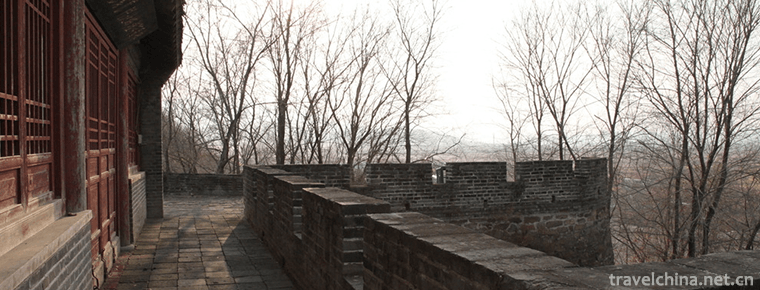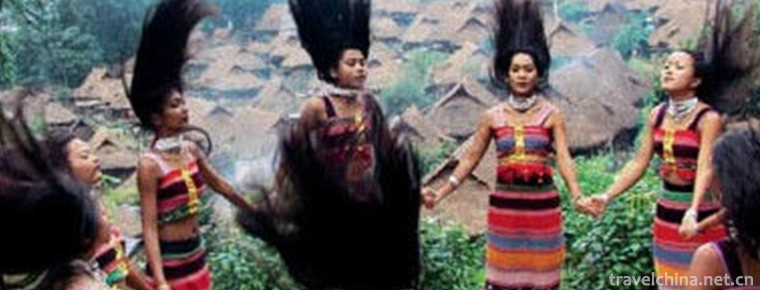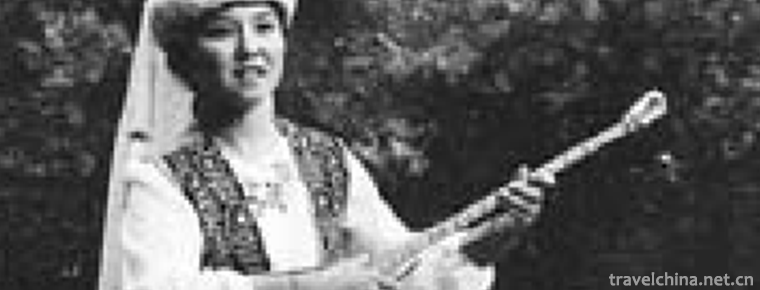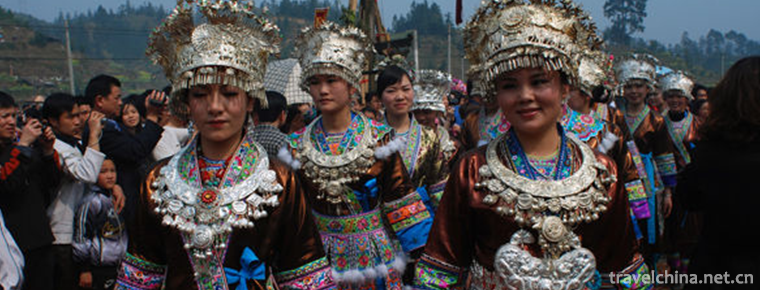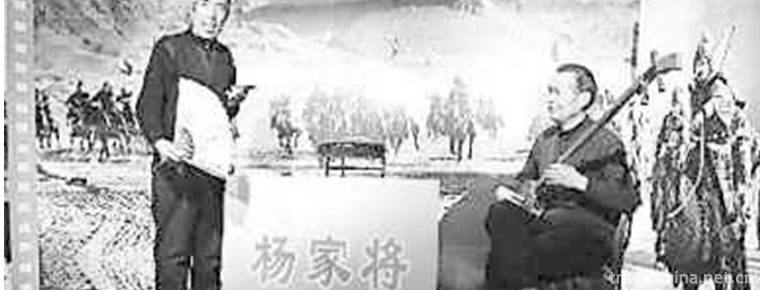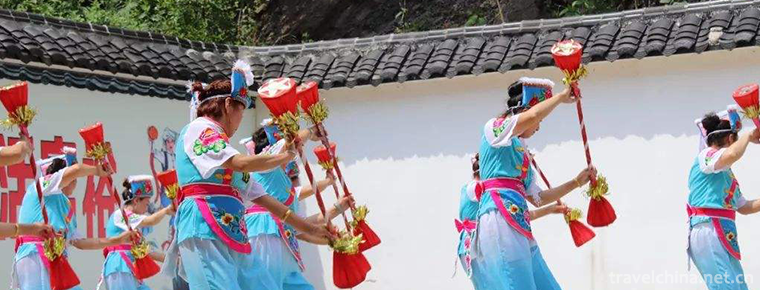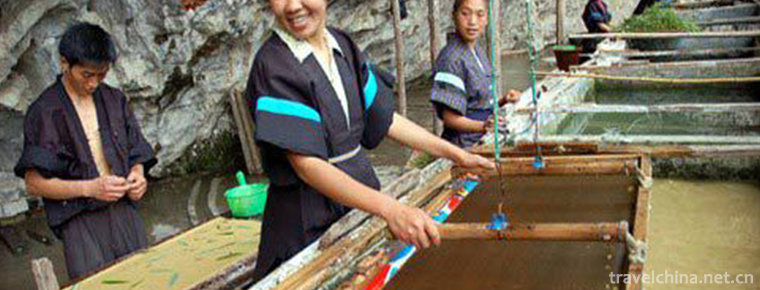Yangzhou Tanci
Yangzhou Tanci
Yangzhou Tanci, the original noun string Ci, is a kind of Tanci system music based on Yangzhou dialect.
Yangzhou's performance of ci-poems is mainly based on speech and supplemented by singing and playing. The representative bibliographies are "Double Gold Ingot", "Pearl Tower", "Falling Gold Fan", "Diao Liu's" and so on.
Yangzhou Tanci and Yangzhou Commentary belong to sister art, which was formed in the late Ming Dynasty and flourished in the early Qing Dynasty, and has a history of more than 400 years. Originated in Yangzhou, it is distributed in Zhenjiang, Nanjing and Lixia River in central Jiangsu. On June 7, 2008, Yangzhou Tanci was approved by the State Council to be included in the second batch of national intangible cultural heritage lists with the heritage number V-50.
Historical Evolution
Yangzhou Tanci, formerly known as string ci, has a long history. The Han Dynasty terracotta figures and the Five Dynasties zigzag Pipa unearthed in the suburbs of Yangzhou are the historical origins of Yangzhou Tanci.
Yangzhou Tanci was formed around the end of Ming Dynasty. The reason why Liu Jingting, a great storyteller, embarked on the way of talking about books, is that according to the Qing Dynasty Taizhou Palace Wei Miao's Biography of Liu Fengchun, Liu Fengchun, the word Jingting... When I hear the words in the street, I hear them." It can be seen that Liu Jingting learned to speak because of the influence of Tanci. The term "string ci" was first seen in Li Dou's Yangzhou Painting Records in the Qing Dynasty. The book mentions several string nouns, such as Wang Bingwen, Qumu Wang Jianming, Gu Hanzhang, Zizhi Dysentery and so on.
Early Yangzhou Tanci was a one-man one-stage rap. During the years of Qing Xianfeng and Tongzhi, it developed into a two-stage performance, which was called "dialog string Ci". Yangzhou Tanci has always been based on speaking, and playing and singing is also an important means of expression. Lin Sumen, a Haojiang native in Jiaqing and Daoguang of the Qing Dynasty, commented in "Three Hundred Chants of the Haojiang River --- Speaking String Ci": "This kind of string ci, playing or singing, is very moving. In the late Qing Dynasty, Yangzhou Tanci had three teaching systems, and Zhang Jingxuan was the ancestor of Zhang's Tanci. Zhou Tingdong is a series of "Zhou Men Tanci". Kong Qingyuan is a series of "Kong Men Tanci". After the Republic of China, Zhou and Kong Ermen have been lost one after another. Only Zhang's Tanci has been handed down from generation to generation, from Zhang Lifu in the late Qing Dynasty to Zhang Huinong in his third generation, and many of Zhang Huinong's disciples. In the late 1950s, Yangzhou Tanci artists participated in Jiangsu Quyi Troupe and Yangzhou Quyi Troupe respectively.
In 1985, Li Renzhen went to Shanghai to perform alone for two months, the venue was full, the social reaction was strong, and immediately became famous in Shanghai. Professor Chen Ruheng of Shanghai Theatre Academy praised Li Renzhen in public: "Yangzhou is the most sophisticated and declining singer. Today's art is Chen. Li Diao has a variety of comments and references. Renzhen is the one who keeps going." Shanghai Radio also recorded "Li Renzhen Yangzhou Tanci Album" for her. With the unremitting efforts of generations, Yangzhou Tanci gradually stepped onto the elegant stage. In 1986, the Municipal Quyi Troupe was invited to perform in Jinjing; in 1992, Li Renzhen accompanied the troupe to perform in Korea, Yangzhou Tanci went out of the country; from 2002 to 2003, Yangzhou Tanci programs such as Shuangzhufeng, Xixiangji and Dalu Chaotian Renren You Go were broadcast continuously on CCTV, further expanding the influence of Yangzhou Tanci in the country. 。
artistic characteristics
Performing Form
Yangzhou Tanci performances are divided into single-stage, double-stage and multi-stage forms. One-man performance in single stage, two-man performance in double stage and three to four-person performance in multiple stages. When performing in double stalls, the actors sit on the desk, cooperate with each other, and talk in different characters'tones and tones. First-hand actors hold three strings, focusing on narration; most of the songs are performed by second-hand actors holding pipa. Often play a song or start a song, and then enter the main book. Nowadays, the beginning of Tanci is also an independent program, which is performed by one or more people. Yangzhou Tanci is a kind of rap art, mainly speaking and singing, supplemented by playing and singing. Its bibliographic content and way of saying are different from Yangzhou's comments.
Speaking out Requirements
In addition to the general rhythm, there are also fast-working, slow-working and winding, of which fast-working is the most commonly used and difficult to say. Speaking requires that there is no sense of pause when breathing. It is necessary to achieve "continuous deliberation, continuous deliberation" and "fast but not disorderly, slow and continuous".
Singing characteristics
Yangzhou Tanci is often expressed in Yangzhou dialect, and when playing its role, it also uses "wharf dialect" from other places to distinguish and depict characters. Two-stage performances, two people cooperate, dialogue in different characters'tones and tones.
Major instruments
The instruments are three strings and pipa.
Qupai tune
Yangzhou Playing Ci and Lyrics are arranged in the book. Commonly used music cards are "San Qi Li Hua", "Zoonan Zhi", "Shen Shui", "Hai Qu", "Dao Qing" and so on. Most of them are feather tunes and commercial tunes. Among them, "San Qi Li Hua" is the most basic and basic melody. It should be said that it is a top-grade melody with beautiful melody, varied forms, wide range of expression and large emotional capacity. The melody is simple and elegant, ancient and fragrant. It has changed little over the years, and is very popular with the audience.
Art School
Since the late Qing Dynasty, Yangzhou Tanci has formed many singing schools, such as Zhou School, Confucian School and Zhang School, but only Zhang School is still handed down. The representative bibliographies of this school include "Double Gold Ingot", "Pearl Tower", "Falling Gold Fan", "Diao Liu's" and so on. After more than one hundred years of development, the singing skills are becoming more and more mature.
Classic repertoire
The traditional bibliographies of Yangzhou Tanci include Jade Dragonfly, Pearl Tower, Double Gold Ingot, Falling Golden Fan, Diao Liu's, Double Pearl Phoenix, Double Hair Cutting and White Snake Biography. "Golden Seal", "Jin Ping Mei", "Er Du Mei", "Ji Du Mei", "Da Hong Pao", "Tianbao Tu" and "Kirin Leopard" have all been lost.
Traditional bibliographies mostly tell talented people and beautiful women's joys and sorrows, family and social life stories, promote good and punish evil, praise loyalty and belittle adultery, the so-called "small book" is also. Each film can perform 15 to 20 performances, only "Jade Dragonfly" and "Double Hair Cutting" have longer lyrics, which can perform more than 60 performances respectively. Most bibliographies are said to be adapted from printed versions of singing (playing ci), which are more abundant than printed versions and quite different from printed versions.
Epidemic areas
Yangzhou Tanci originated in Yangzhou and spread around Zhenjiang, Nanjing and Lixia River in central Jiangsu.
Inheritance and Protection
Current situation of circulation
Under the double impact of the economic tide and foreign culture in the 21st century, Yangzhou Tanci has a hard life and few successors. It needs to be protected urgently so as to facilitate its inheritance and development.
protective measures
Yangzhou Quyi Research Institute attaches great importance to the inheritance and rescue of traditional Quyi, collates and publishes traditional bibliographies, records image materials of classical bibliographies of non-hereditary successors, transplants and adapts long bibliographies, and opens the website of Yangzhou Quyi Network of China, which makes Yangzhou Quyi have a fully displayed network platform.
Selected as a non-survivor
On June 7, 2008, Yangzhou Tanci was approved by the State Council to be included in the second batch of national intangible cultural heritage lists with the heritage number V-50.
representative figure
Li Renzhen, female, born in 1946 in Yangzhou, Jiangsu Province, is a national first-class actor. When I was young, I was poor and self-taught. In 1960, I was admitted to Yangzhou Quyi Troupe. I studied Wusong with Mr. Wang Shaotang, the master of Yangzhou Quyi Art, and Wang Wanqing, a famous Qingqu artist in Yangzhou. Then I paid tribute to Zhang's family. She reformed the pipa performance of Yangzhou Tanci greatly, changing the original upper to upper, middle and lower, enriching the melody changes and increasing the range of changes in the tone. She reformed the tunes of Yangzhou Tanci, created more than 100 new tunes of Yangzhou Tanci, and formed a unique style of Li School Li Diao art. Li Renzhen gives full play to her personal strengths. She pays attention to the rhythm and rhythm of musical language in her performance. She speaks with Pipa and touches her artistic conception. She has exquisite expression, clear layers, clear roles, natural performance and deep foundation. She is praised as the "Queen of Playing Ci". In June 2009, Li Renzhen was selected as the representative successor of the third batch of national intangible cultural heritage projects.
Xu Guiqing, female, entered the Yangzhou Quyi Troupe in 1960 when she was only 12 years old. At the age of 15, Xu Guiqing officially performed on the stage. The first one was the representative work of Zhang's Tanci, Pearl Tower. Then began the life of "running the dock" everywhere, stepped on the stage one after another, summed up experience one after another. Xu Guiqing's performance became more and more mature. With the growth of age, it formed a sincere, generous action, mellow singing style. Xu Guiqing, a mature artist, began to think about how to innovate his performance. The reform of Guan Xiugu's singing tune in The Cause of Laughter and Initial Entry into the General's Palace is an attempt. The original tune is the traditional tune of Yangzhou Tanci, "San Qi Li Hua". She boldly blended Yangzhou Qing Opera with folk music, making the tune more euphemistic, maintaining both the traditional local style and new charm. In addition to the traditional bibliography, Xu Guiqing also participated in the creation of many new tunes. After her retirement, she founded the "Clear Sound Studio" and the "Sanxia" Art Troupe, which brought a large number of local opera, puppets, singers and dancers from old, middle-aged and young people to the banner in the urban area to discuss their skills and enjoy themselves.
Honorary recognition
The opening of Yangzhou Tanci, "The Long Canal Willow" won the program award of the 6th Jiangsu Quyi Festival.
Yangzhou Tanci "Sheng Shi Hongling Love Suit" (multi-level) won the excellent program award and excellent creation award of the 7th Jiangsu Quyi Festival.
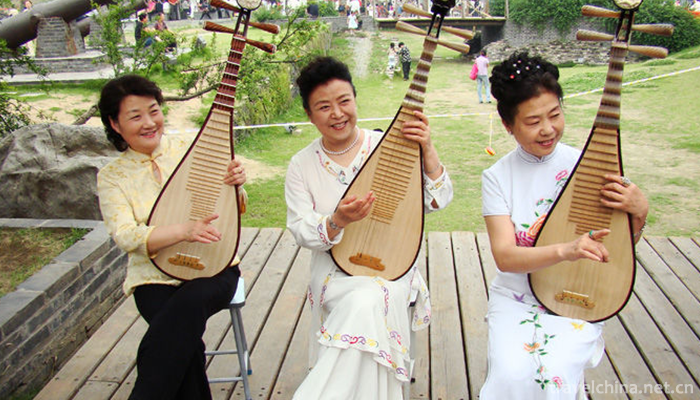
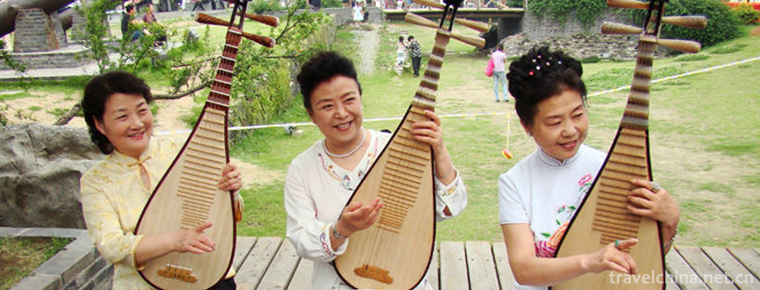
Yangzhou Tanci
-
The ancient city of Hetuala
The ancient city of Hetuala is located in Yongling Town, Xinbin Manchu Autonomous County, Liaoning Province. It is 5 kilometers west of Qingyongling
Views: 229 Time 2019-01-13 -
Limutai Natural Scenic Area
Limutai Natural Scenic Spot is located at the northernmost end of Tianjin, known as "Tianjin Arctic". In the scenic area, the peak forest and canyon are strong and dangerous
Views: 216 Time 2019-01-29 -
Shanghai Changfeng Ocean World
Shanghai Changfeng Ocean World belongs to the world's largest aquarium chain brand of Merlin Entertainment Group, which is the first and second largest in Europe
Views: 243 Time 2019-03-17 -
Baxian longevity noodles
Make it with Udonghua noodles. With turtle, old turtle boiled soup, turtle has a nourishing role, old turtle represents longevity. Take shrimp, squid, sea cucumber, black fish balls
Views: 212 Time 2019-03-27 -
Alpine Hand in Hand Dance
"Hand-in-hand dance" is a kind of self-entertainment dance with the longest history and widespread spread spread among the folk dances of the mountain nationality. During the wedding and fes
Views: 111 Time 2019-04-30 -
Kazakh Dongbra Art
Winter Bula's strength and speed vary widely, especially for fast music. Dongbula is suitable for men and women. The basic method of playing is playing and picking.
Views: 208 Time 2019-05-02 -
Miao Series Slope Cluster
Miao Series Slope Club refers to the festival activities of villages and villages in Rongshui County, Guangxi Zhuang Autonomous Region during the period from the third to seventeenth day of the first
Views: 160 Time 2019-06-05 -
Uygur Medicine
Uygur Medicine magazine provides medical workers with good opportunities for education, continuing education and academic exchange platform, and is committed to improving the comprehensive quality of
Views: 305 Time 2019-06-26 -
Legend of Yang Jiajun
The Legend of Yang Jia Jiang is a kind of literature expressed by folk rap in Northwest China. The story of the generals of the Yangs has a long history. It began to circulate as early as the Song Dyn
Views: 144 Time 2019-07-11 -
Encouragement of Sangzhi Battle
Sangzhi Bai people's fighting drum is mainly distributed in seven Bai villages and towns, such as Mahekou, Maidiping, Furong Bridge, Hongjiaguan, Zoumaping, Linxi River and Liu Jiaping. In other half
Views: 435 Time 2019-07-25 -
Zhongyuan Festival Chao Ren Yulan Winning Club
Chao Ren Yulan Sheng Hui is a traditional folk custom and folk belief activity. The fifteenth day of the seventh lunar month is commonly called "ghost festival" in Hong Kong. It is said that
Views: 185 Time 2019-08-10 -
Bamboo Paper Making Skills
Bamboo paper production maintains a complete traditional process. It is manually made by dipping paper. There are 15 links and 72 processes from material selection to paper making. The production proc
Views: 217 Time 2019-08-10
